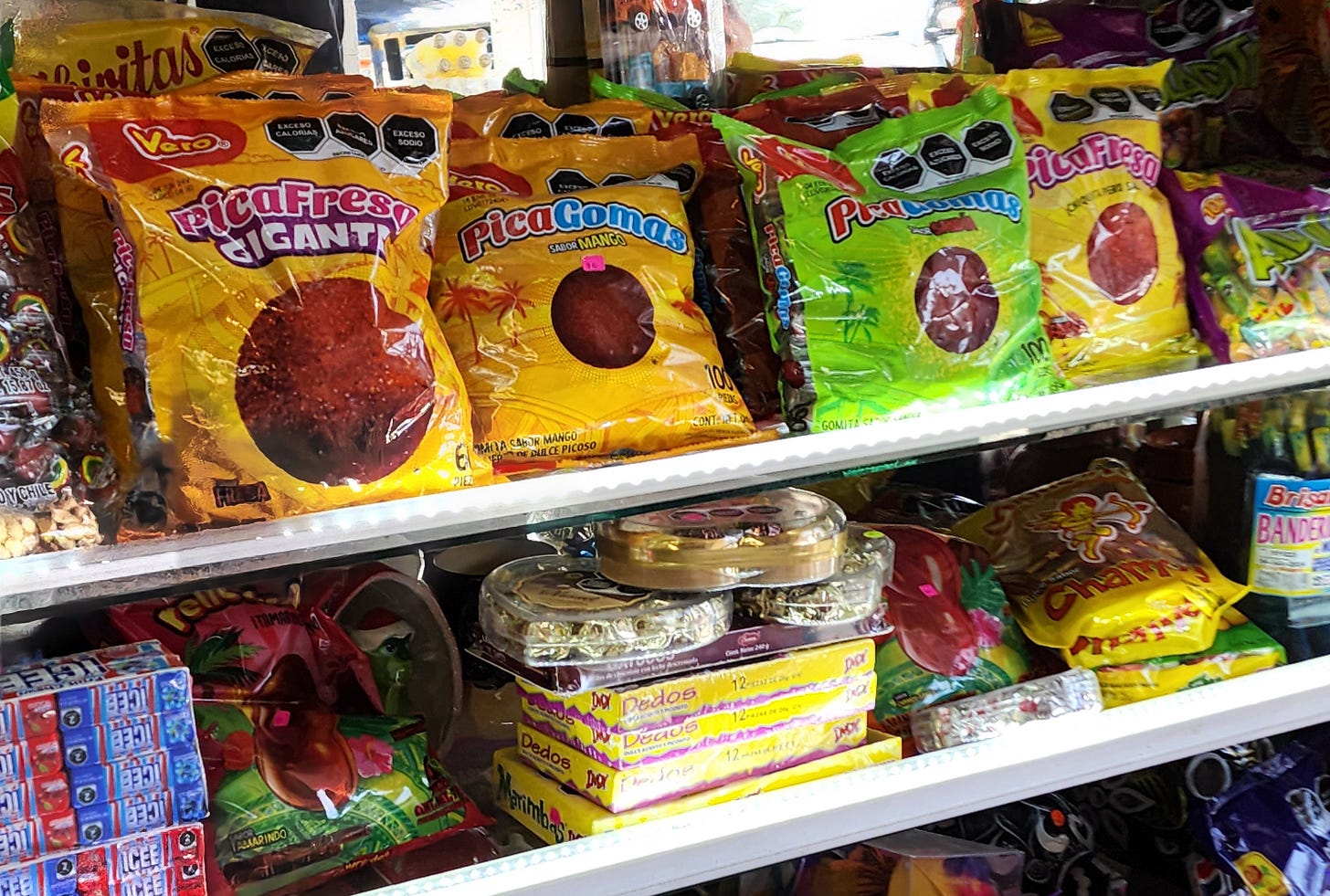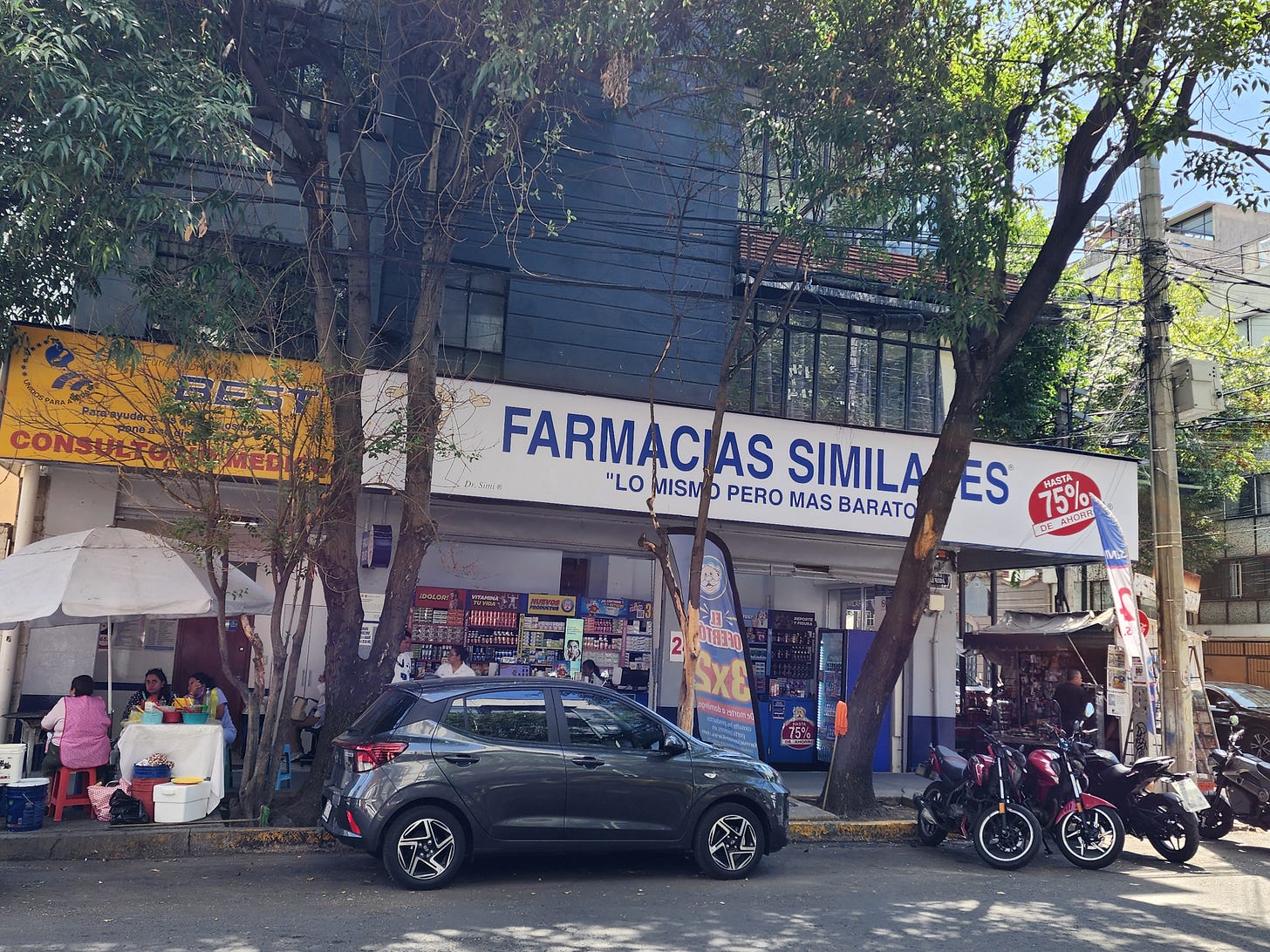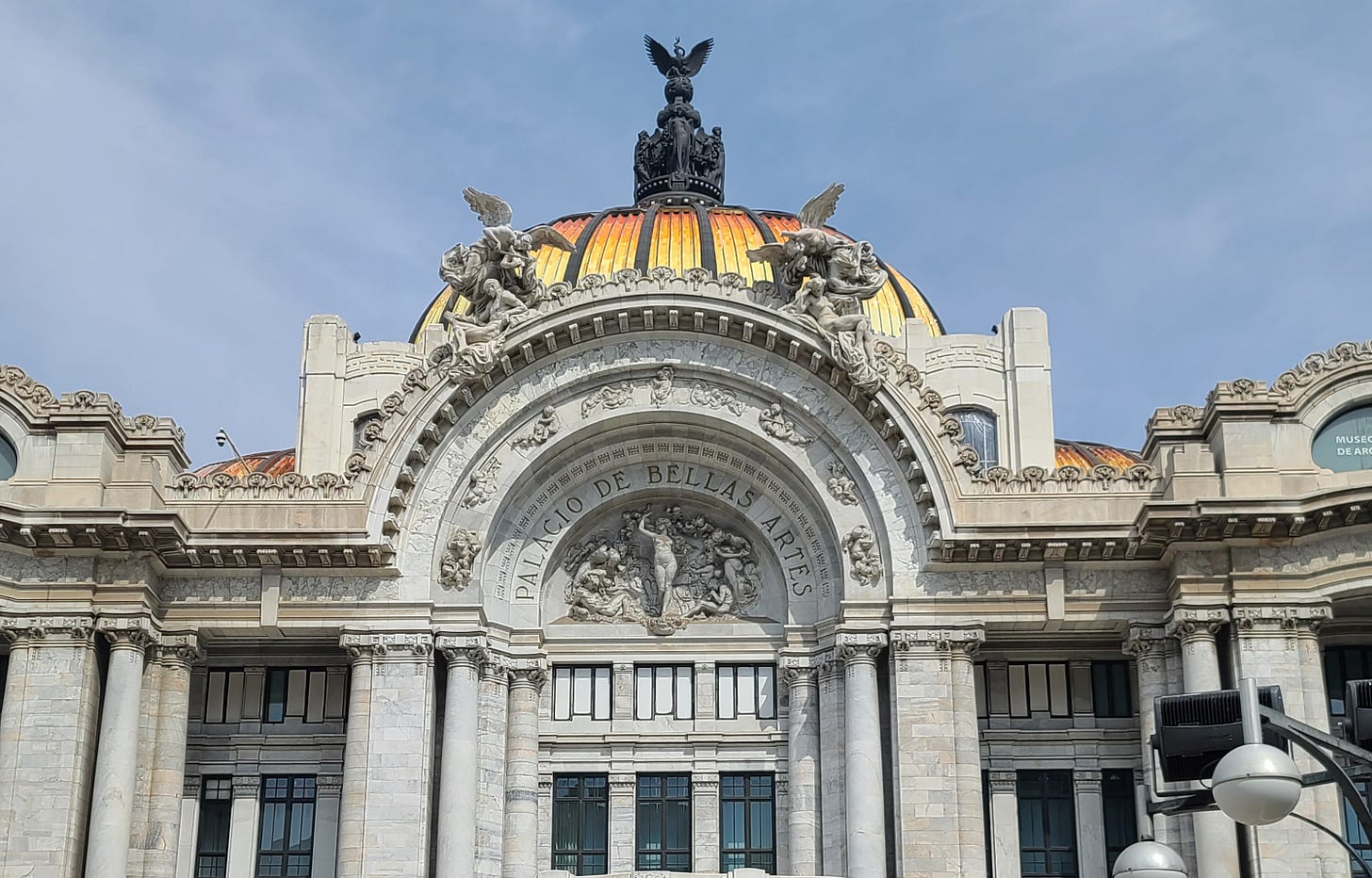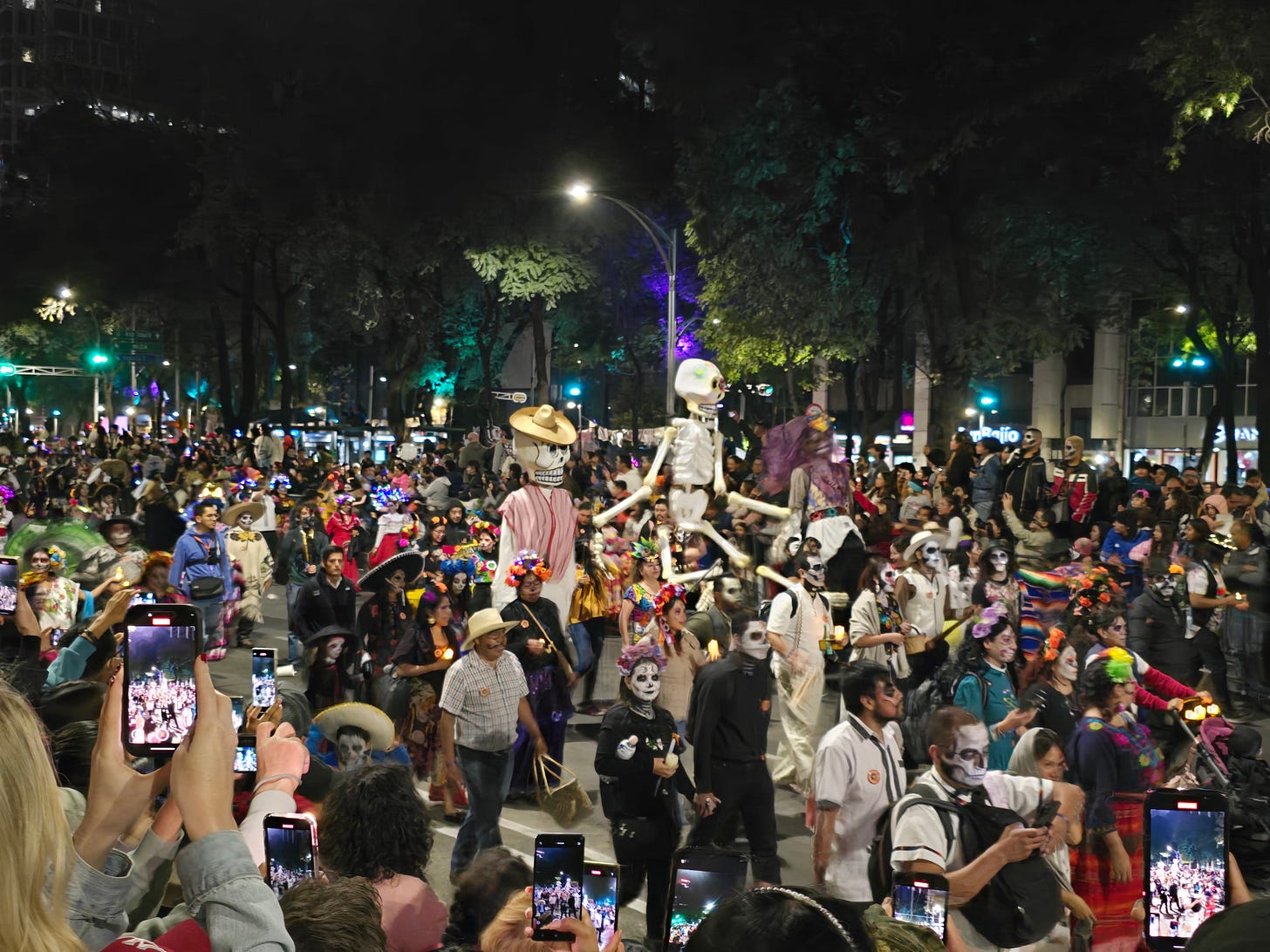✈️Mexico City: 6 key tips for first-time visitors
From restaurant hours to shopping for essentials to dealing with noise, here's what we wish we had known before our first visit to Mexico City.
For all our tips, recommendations, and itineraries, grab a copy of Eternal Spring: Our Guide to Mexico City. It's optimized for your phone, with links to everything you need for your trip.
Every place has its quirks. And while Mexico City offers a straightforward travel experience for the most part, it can also be delightfully—sometimes frustratingly—different in unexpected ways.
Here are a few things to know that may not be immediately obvious to the visitor.
🛑1. Many places are closed on Sundays and Mondays

Growing up in Massachusetts many moons ago, we were subjected to so-called blue laws that prevented the sale of alcohol on Sundays, a literally Puritanical practice that wasn’t repealed until 2004. In Mexico City, many restaurants and sights are closed on Sunday night and all day Monday, so you need to plan around that.
To us, this strange weekly occurrence is both a blessing and a curse. The places that are open Sunday night are often quite busy, and for many Chilangos, Sunday night is treated like a Friday or Saturday night, a time to stay up late, let loose, and get loud. But this also means that Monday, in particular, is quiet, the quietest day of the week. And that can be a nice break after a particularly rowdy weekend.
But Mondays will be problematic for the traveler, as you’re likely here for a short period of time. So do your research and make sure the places you wish to visit are open that day. That’s true of restaurants as well. So any Mondays on your schedule will require a bit more work than most other days. You can’t just show up and assume that a museum or bucket-list restaurant is open.
Mexico’s public holiday schedule can also impact your trip, so it’s helpful to know whether your visit coincides with a holiday that might impact the Metro and Metrobus, museums and other sights, and restaurants and bars.
Most of Mexico’s holidays are just inconveniences because of business closures. But two, Dia de la Independencia (Mexico’s Independence Day) and Dia de los Muertos (Day of the Dead, a multi-day celebration) are both incredible to behold and quite disruptive and even dangerous for visitors because of the crowds.
📅Mexico City holiday calendar
You may be surprised to discover that Cinco de Mayo, celebrated on May 5 (of course), is not a public holiday in Mexico, given its popularity in the United States and elsewhere. But you can thank beer company advertising for that.
This holiday isn’t the Mexican independence day, as many believe. Instead, it celebrates a military victory over a foreign power, in this case the French in Puebla, in 1862. As such, it’s a big deal in Puebla. But it goes unmarked in Mexico City and much of the rest of the country.
Here are the public holidays celebrated in Mexico each year.
January
Año Nuevo. Banks and many businesses are closed on New Year’s Day, January 1.
February
Dia de la Constitucion. On the first Monday in February, Mexico celebrates the ratification of its Constitution in 1917.
March
Cumpleaños de Benito Juarez. In the third week of March, Mexico observes a public holiday to commemorate the birth of Benito Juarez, its first president. This holiday occurs on the Monday that’s closest to his March 21 birth date.
March or April
Semana de Pascua. The Thursday and Friday of Easter week—Holy Thursday and Good Friday—are public holidays in Mexico. Because the timing of Easter changes each year, it’s difficult to pin down the specific dates.
May
Dia del Trabajo. This is Labor Day in Mexico, and it’s celebrated on May 1. Banks and businesses are closed, but shops and markets remain open.
September
Dia de la Independencia. Mexico commemorates its independence from Spain each year on September 16, though celebrations begin the night before. Because Mexico City is the capital, this holiday is particularly important, with throngs of people coming to the Plaza de la Constitución, or Zócalo, to see the president ring the Dolores bell on the outside of the Palacio Nacional (National Palace) at 11 pm on November 15.
October and November
Transmision del Poder Ejecutivo Federal. On the October 1st of presidential election years— which happens every six years, most recently in 2024—Mexico observes a public holiday to mark the peaceful transfer of power.
Dia de los Muertos. Mexico’s famous Day of the Dead celebrations officially take place November 1 and 2 each year, but this is really a multi-day event that begins in late October and subsumes the closest weekend.
This is arguably the busiest time of the year in Mexico City and in the Zócalo area, in particular, with multiple parades, street closures, and interruptions to the normal operations of banks and businesses.
Dia de la Revolución. Mexico commemorates the beginning of its 1910 revolution on the third Monday of November each year, giving many workers a three-day weekend.
December
Dia de Navidad. Christmas Day is a public holiday that’s observed on December 25 each year.
👀2. Look both ways, then do it again
Thanks to its size, the crowds, and all the noise, the touristic parts of Mexico City can sometimes feel overwhelming. And that’s particularly true if you’re a small-town mouse in the big city.
You need to look out for yourself. Much of this is common sense, but be sure to look both ways, twice, before crossing any city street, even if you have a walk signal: While the laws are clear, the drivers here often ignore them by forming lanes that don’t exist, driving erratically, and ignoring stop signs and signal lights. And many intersections don’t have either, so the most aggressive driver—or pedestrian—gets to go first.
🚗3. Do not rent a car
We learned to drive in Boston, one of the most notoriously aggressive cities for driving in the United States. But Mexico City is on another level, with crowded streets with unmarked lanes and intersections with no stop signs or traffic lights. There are potholes everywhere, and pedestrians, bicycles, and mopeds chaotically appear out of nowhere.
As bad, parking can be next to impossible depending on the neighborhood. Many locals reserve parking spaces for themselves in the street using an empty water bottle or other object, making seemingly open spots inaccessible to others.
Given how inexpensive and convenient Uber and public transportation are in this city, there is no version of this that makes sense. Do not rent a car and do not drive in Mexico City.
If you’re familiar with public transportation, you’ll find the Metro easy to navigate. If not, here’s what to know:
🏪4. Take advantage of the corner store

When we lived in Phoenix, Arizona a million years ago, we joked about giving directions by only referencing the many Circle K convenience stores that were all over the city. In Mexico City, the equivalent is called OXXO, and it’s a great place to grab a bottled water, snack, batteries, or anything else you’d find in a convenience store back home.
If you’re staying in a residential neighborhood like Condesa or Roma Norte, be sure to visit the local inspiration for OXXO, the aborrotes, or small convenience stores that sometimes seem to be found on every street corner.
The term aborrotes literally means “groceries,” and these tiendas do offer small selections of groceries. But they are treated by locals as the pantry for the people who live in that neighborhood. And they offer a wide variety of items—everything from ice and water to alcohol, toilet paper, and aspirin—for those in need. There’s usually one a block or two away, at most.
🩺5. Know where to get medical help

Nobody wants to have a medical experience while traveling, and that’s even more true when it’s an international destination with language challenges. But Mexico City offers first-class healthcare regardless of need. And some perks that are unusual for those coming from the United States.
You can find the basics—aspirin, cough medicine, and the lip balm you will never stop needing in this city—at an OXXO or local aborrote. But a pharmacy is a better choice. As with Paris and other European destinations, Mexico City is full of pharmacies. They’re everywhere.
They’re also dramatically better than the pharmacies we know from the United States. In Mexico City, you can buy most medications over the counter, including those that require a prescription back home, and at much lower prices. The only exceptions are antibiotics and controlled substances like Adderall.
Many pharmacies also partner with a doctor, who is typically next door in a small office. This is handy if you’re experiencing a non-life-threatening medical event and need help.
The doctor can diagnose you on-site, and if you require medication, they can prescribe it and you can pick it up at the attached pharmacy. As with most other things in Mexico City, this service, and a prescription, if required, is inexpensive.
If you do have an emergency, there are high-quality hospitals of all sizes all over Mexico City as well. Hopefully, you’ll never need to visit one, but it makes sense to search Google Maps when you book your stay to see where the closest facility is located.
And it’s always possible that the unfamiliar food, sauces, and drinks you encounter here will trigger a bad day. We’ve been lucky over years of trips, but both of us have succumbed to some form of stomach issue at least a few times. To combat this, we often take Pepto-Bismol or an equivalent each morning for the first week or two on a trip.
📣6. Be prepared for noise
Big cities are always loud, but Mexico City takes this to 11 thanks to a cultural phenomenon here that is as baffling to us as it is easily stated: Mexicans are addicted to noise.
You will hear loud music blaring from the strangest of places—like pharmacies—and at the strangest of times, such as when a proprietor is opening their business early in the morning. There is noise everywhere, from the sirens and rumbling trucks on the streets to the cacophony of street vendor noises and catcalls that mark the passage of time each day.
How this impacts you will depend on where you stay and spend your time. We always recommend traveling with good ear plugs and noise-cancelling headphones or earbuds, but this is doubly important in Mexico City. Noise can break out at any time, and often does.
Paul is particularly sensitive to noise, so there were worries that this aspect of Mexican culture would undermine our adventures here. Our neighborhood is relatively quiet most of the time, and we’ve only had to fall back on our ear plug advice a handful of times in over three years.
Don’t let a nearby club that’s open all night on weekends and pumping out a steady thump-thump-thump of music ruin a trip. So yes, read the Airbnb reviews carefully. But think ahead, too. Mexico City can be loud.









"Forming lanes that don't exist" had me laughing and rolling my eyes at the same time!
I had to laugh: "...lip balm which you'll need..." I've only been here 10 days and have used up the roll I brought.
Who knew!? This made me laugh out loud